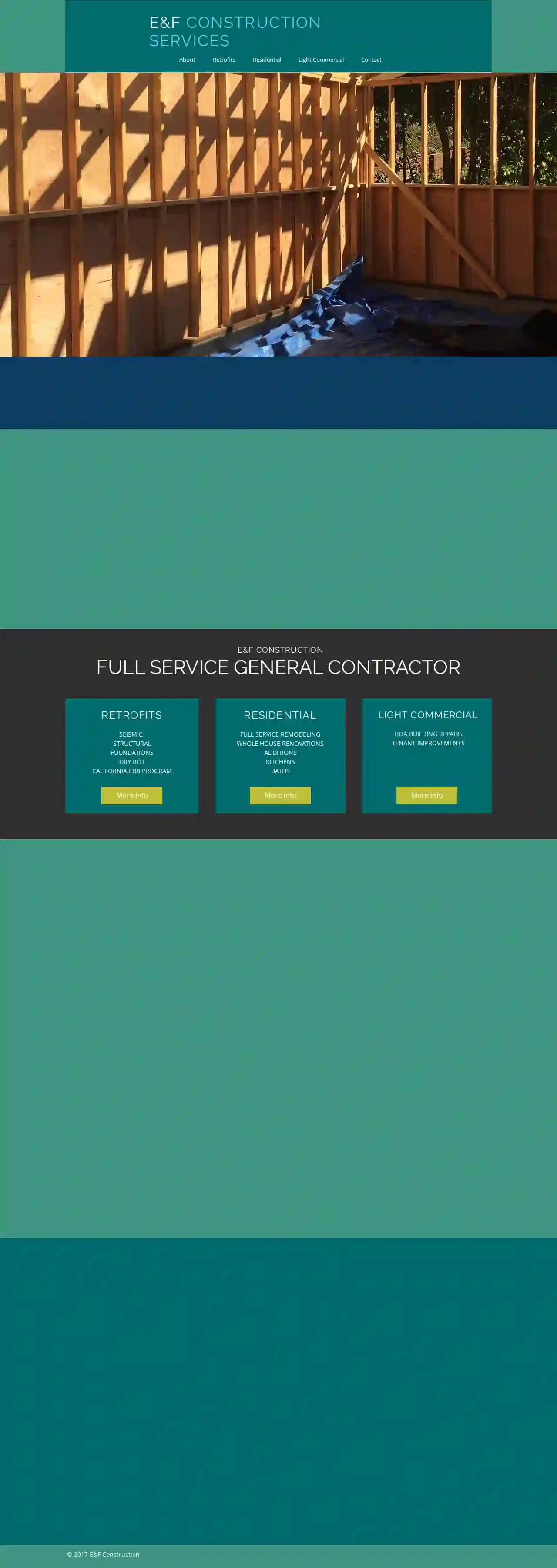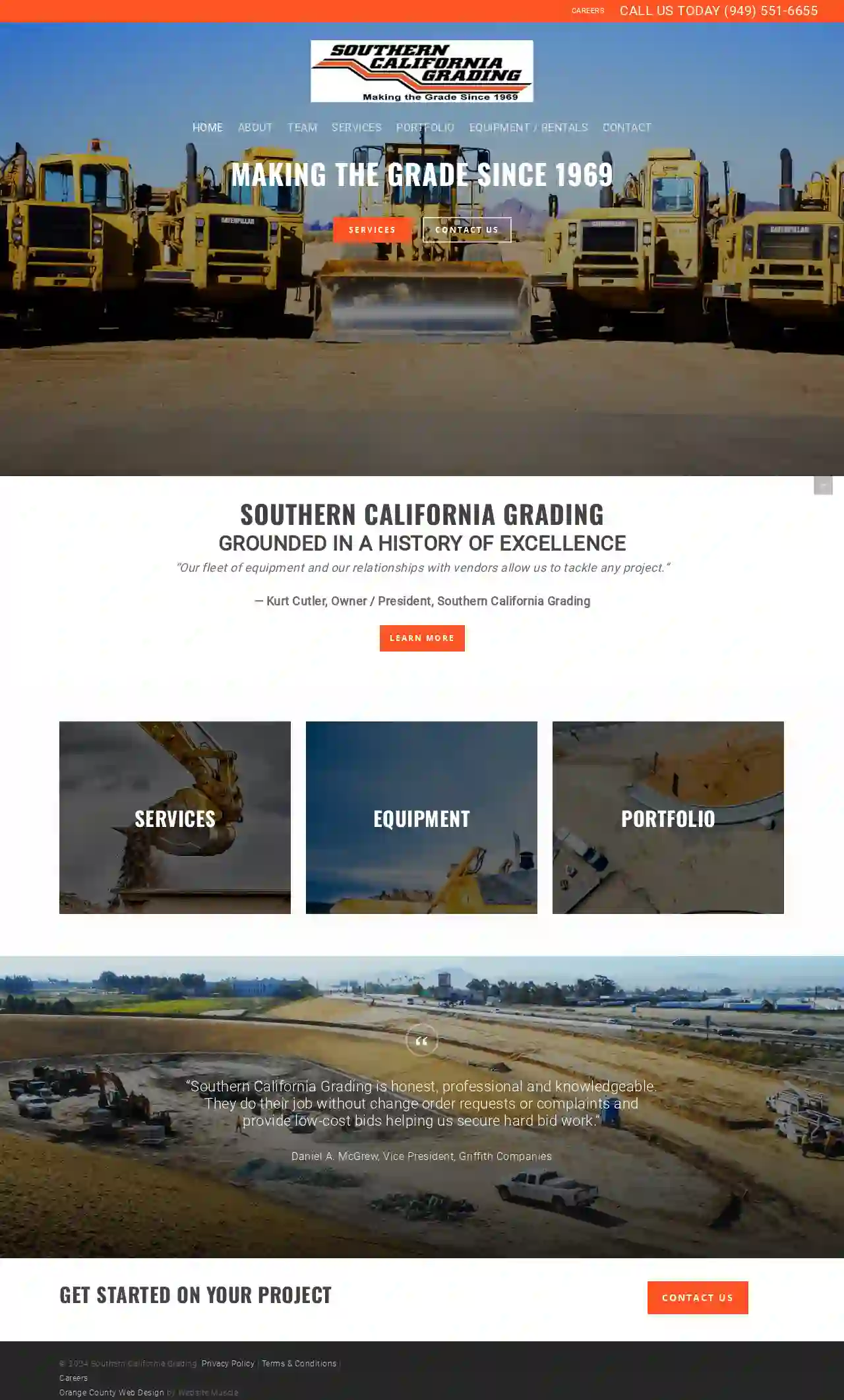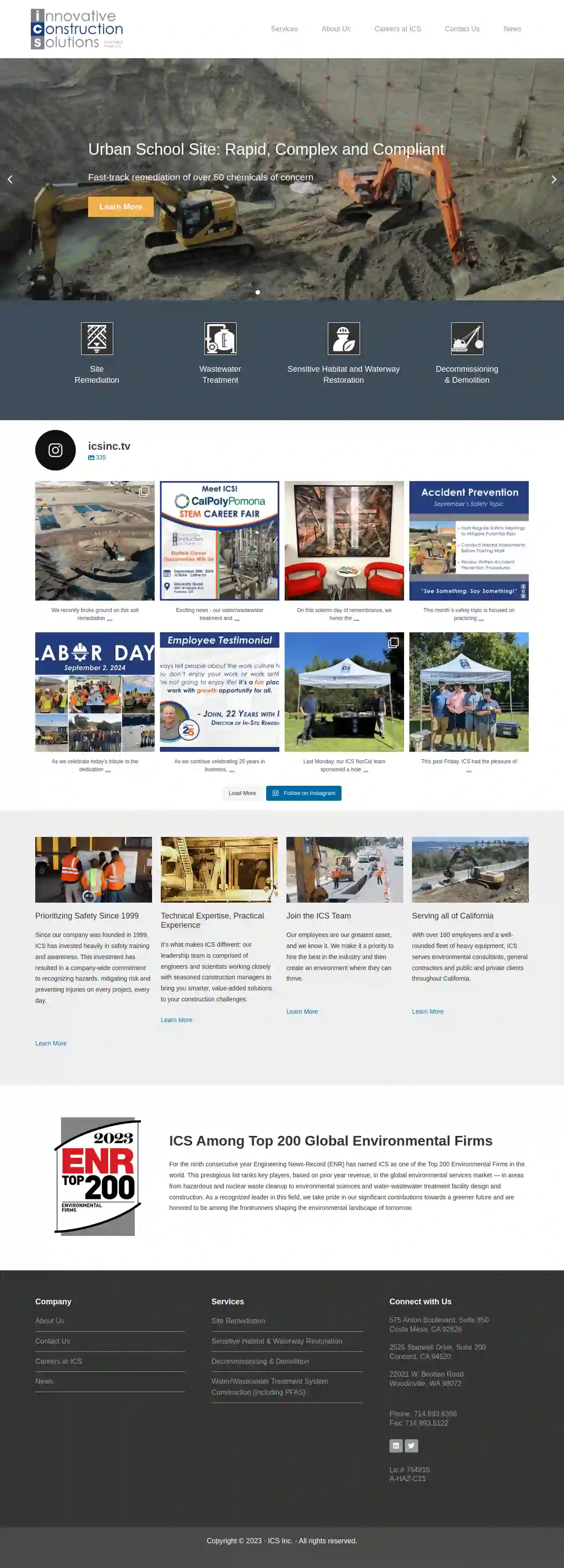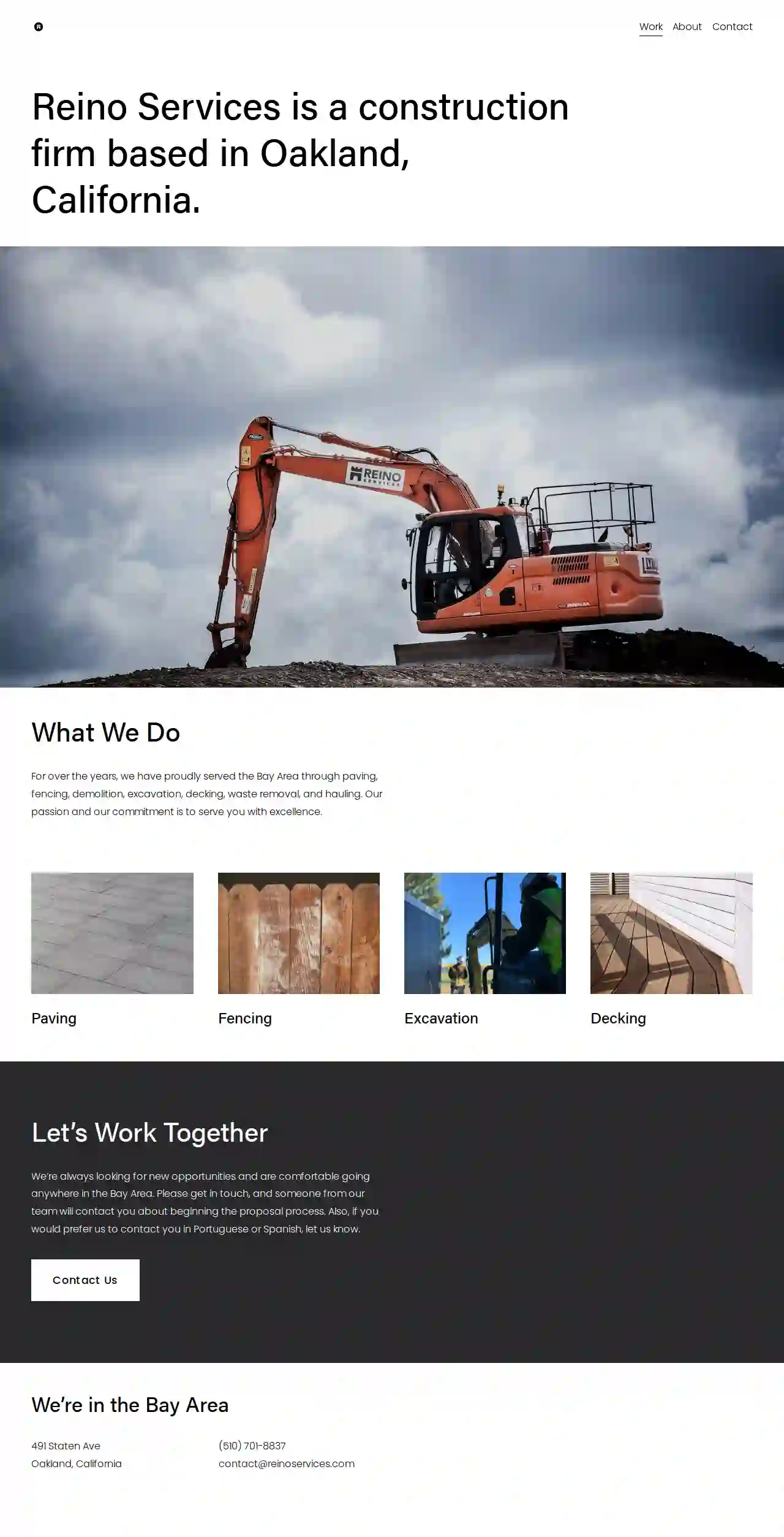Excavation Contractors Desert Hot Springs
Best Excavation Contractors in Desert Hot Springs
Receive multiple Excavating Contractor quotes for your project today! Compare profiles, reviews, accreditations, portfolio, etc... and choose the best deal.

Roto-Rooter Plumbing & Water Cleanup
4.8275 reviewsRancho Cucamonga, USYour Local Roto-Rooter Plumber in Rancho Cucamonga, CA Roto-Rooter of Rancho Cucamonga is your trusted plumbing partner. We ride to the rescue 24/7, 365 days a year, to handle your most pressing plumbing needs, with our team of expert plumbers in Rancho Cucamonga to deliver a full range of services. From drain cleaning to complete sewer line repairs, we come fully licensed and insured for every plumbing challenge — and we serve both residential and commercial properties, no matter the size of the job. Roto-Rooter: America's Go-To Plumbing Provider Since 1935 Roto-Rooter has been America’s go-to, do-it-all plumbing provider since 1935. That’s why we're the premier plumber in Rancho Cucamonga, CA, with a long-standing reputation for quality that includes: Same day service 24/7 availability No hidden or extra charge for plumbing or drain service on holidays, nights, and weekends Onsite and upfront estimates Fully licensed, insured, experienced plumbers State-of-the-art diagnostics and equipment Senior and military discounts Coupons and financing options available We take pride in providing exceptional service to our customers in Rancho Cucamonga and the surrounding areas. Our team of experienced plumbers is dedicated to providing fast, reliable, and affordable solutions for all your plumbing needs.
- Services
- Why Us?
- Testimonials
- Gallery
Get Quote
E&F Construction Services
4.73 reviews851 TRESTLE GLEN RD, Oakland, 94610, USAbout E&F Construction E&F Construction was founded in 2004 by Tony Elenteny, who brought years of experience from his family's construction company. In 2015, Paul Hollenbach, with over 15 years of experience running his own construction company, joined forces with Tony. Together, they combined their expertise to create a construction company with over 35 years of experience in general contracting and project management. Their areas of expertise include seismic retrofits, high-end kitchen and bath renovations, whole home remodels, foundation and structural repairs, and light commercial tenant improvements and HOA projects throughout the East Bay. At E&F Construction, they take pride in their exceptional customer service, responsiveness, and clear communication throughout every stage of a project. Whether you have plans ready or are just starting to consider changes to your home or business, their skilled, clean, and thorough crews are available to meet your needs efficiently and within budget. Personally supervised by Tony and Paul, every E&F crew consistently demonstrates meticulous attention to detail, design aesthetics, efficient use of space, timeliness, and respect for your property. E&F Construction understands that making significant aesthetic or structural changes to your home or business is a complex process with many moving parts and a high potential for costly errors. They believe that when done right, improvements can add lasting value, increasing your ROI, satisfaction, and enjoyment of the space. Whether you're looking to earthquake-proof your building, add a master suite, or give your entire home a refresh, your time, money, and project deserve the skilled workmanship, effective project management, and trustworthiness that E&F Construction represents. Don't let your dream project turn into a nightmare. Let E&F Construction handle all your construction needs now and in the future. They care about you and your project! Check us out on Yelp.
- Services
- Why Us?
- Our Team
- Gallery
Get Quote
Urban Irvine Construction
56 reviewsSuite A, 16291 Construction Circle East, Irvine, 92606, USGrounded in a History of Excellence Southern California Grading was founded in 1969 by Bob Cutler and Bob Kehrer—two friends with extensive hands-on engineering and earthwork experience. In our early days, when Orange County was just starting to grow, we forged strong relationships with developers like the Irvine Company. Successful projects ranging from commercial ventures to developing new roads made Southern California Grading essential to bringing people and businesses to Irvine. These efforts began decades-long relationships with our clients and peers in the construction community. A Legacy of Teamwork and Mutual Respect Based in Irvine, California, Southern California Grading is still family-owned, and we pride ourselves on the core values of teamwork and mutual respect. Over the years, we have developed strong relationships with many clients and devoted employees. Some have been with us for over 25 years. Southern California Grading at a Glance $25 million in annual revenues Bondable and insured with an A+ rating Banks with one of the largest U.S. financial institutions Owns and rents its own fleet of heavy equipment Diverse market expertise Our Commitment to Excellence Our core principles of integrity, respect, responsibility and hard work have made us a premier provider of grading and construction services since 1969. We enjoy the challenge of navigating the ups and downs of our industry by focusing on client needs and adapting to industry advancements. A Firm Foundation for Success Today, Southern California Grading has a long history of successful projects throughout California. We’re proud of our reputation as a company that reliably provides a firm foundation for even the most complex building projects. Our experienced employees, technologically advanced equipment, and proven procedures provide assurance that the project will be completed on-schedule, within budget and done right, the first time.
- Services
- Why Us?
- Accreditations
- Gallery
Get Quote
AAA Backhoe Service
51 reviewsModesto, USExperienced, Trusted Contractor Specializing in Septic Installs, Repairs, Replacement & Pumping, Utility Trenching, and Grading/Excavation For the best septic tank installation and repair, septic tank pumping, utility trenching, and grading/excavation services in Merced County, Stanislaus County, and San Joaquin County, choose A-1 Septic and AAA Backhoe Service. For over 30 years, we've been the preferred septic tank company and excavator for thousands of general contractors, builders, commercial businesses, property managers, city agencies, homeowners, and real estate agents. They trust us because we consistently deliver high quality workmanship and personalized customer service at very competitive prices. Whether you need septic tank repair in Modesto, leach line additions in Ceres, or utility trenching in Salida, we have the skills, knowledge, and expertise to get the job done according to the highest industry standards. Septic System Design, Installation and Repair For Custom Homes, Industrial Facilities, Agricultural Buildings, Restaurants, County Buildings, and Office Buildings Our owner has been designing, installing and repairing septic systems since 1985. He is extremely well-qualified to provide recommendations on the best septic system design and layout for properties of all kinds throughout Stanislaus County, Merced County, and San Joaquin County. With a team of highly skilled staff, well-maintained equipment, and extensive hands-on experience, we are fully equipped to handle all the details of complete septic system installation from start to finish. This includes everything from leach field design and installation, to excavating and grading, utility trenching, and installation of plastic, fiberglass, and concrete septic tanks. One-Stop Shop for Demolition, Foundation Trenching, Grading, and Excavation Services in Modesto, Oakdale, Riverbank, and Surrounding Areas At AAA Backhoe, we are vertically integrated to handle construction jobs of all sizes, from utility trenching for sewer, gas, and telecommunication lines, to swimming pool removal, home demolition, clearing and grading of vacant lots, and trenching for foundations, footings, and retaining walls. Whether you need dirt compaction for a construction site in Salida, joint trenching for a new home site in Escalon, or backfill for a new foundation in Oakdale, we are the best choice for excellent workmanship at a cost-effective price. Modesto's Best Value in Septic Tank Pumping, Cleaning, and Maintenance Services A-1 Septic offers both one-time and regularly-scheduled septic tank pumping, cleaning and maintenance services for Modesto, Escalon, Oakdale, Riverbank, and surrounding areas. During a septic tank cleaning, our experienced septic tank truck drivers will also look for signs of potential septic system failure, such as cracks and leaks in your septic tank or wet spots in your yard. Our affordable, thorough septic pumping services help ensure a long-lasting, well-functioning septic system, particularly when paired with our septic tank bacteria additives.
- Services
- Why Us?
- Testimonials
- Gallery
Get Quote
Innovative Construction Solutions
52 reviewsCosta Mesa, USICS: Your Partner in Environmental Remediation and Construction ICS is a leading provider of environmental remediation and construction services, specializing in complex projects that require a high level of expertise and experience. We have a proven track record of success in a wide range of industries, including: Site Remediation Wastewater Treatment Sensitive Habitat and Waterway Restoration Decommissioning and Demolition Water/Wastewater Treatment System Construction (including PFAS) Our team of highly skilled professionals is committed to providing our clients with the highest quality services, on time and within budget. We are dedicated to safety, environmental protection, and community engagement. We are proud to be a trusted partner for our clients, and we are committed to exceeding their expectations.
- Services
- Why Us?
- Gallery
Get Quote
Sierra Construction
51 reviewsPO Box 5080, Sonora, CA, PO Box 5080 Sonora, 95370, USAbout Us We are an A and B licensed contractor located in Tuolumne County, CA. Our expertise is in grading and excavation. We offer high quality service for affordable prices that put us a step ahead of the competition. PROMPT AND RELIABLE At Sierra Construction our clients are our priority. We take pride in doing what we say we will do in regards to project timelines/budgets and we go the extra mile to make sure our customers are completely satisfied with our work. Call us today and find out what we can do for you.
- Services
- Why Us?
- Gallery
Get Quote
SoCal Excavation
52 reviewsEl Cajon, California, United States, USAbout SoCal Excavation With over 15 years of experience in the grading and excavation, demolition & trucking, SoCal Excavation has become a trusted name in the field of construction. Our team of experts has the knowledge, skills, and expertise to handle any project, big or small. We have completed numerous projects ranging from residential to commercial, and our clients can attest to our commitment to quality and excellence. Our Team Our team is made up of experienced and skilled individuals who are passionate about what they do. From our project managers to our skilled tradespeople, we work together to ensure that every project is completed to the highest standard. We believe in building lasting relationships with our clients, and it shows in the way we approach every project. Our Services At SoCal Excavation, we offer a wide range of services to meet the diverse needs of our clients. Our services include demolition, grading, excavation, trenching, house pads, pools and much more. We work closely with our clients to understand their unique needs and deliver solutions that exceed their expectations. We are committed to delivering projects that are on time, within budget, and of the highest quality.
- Services
- Why Us?
- Gallery
Get Quote
Reino Services
51 reviews491 Staten Avenue, Oakland, USAbout Reino Services Reino Services is a construction firm based in Oakland, California. We've been serving the Bay Area for over 17 years, specializing in a wide range of services including paving, fencing, demolition, excavation, decking, waste removal, and hauling. Our commitment is to consistently innovate and deliver exceptional results, creating aesthetically pleasing pathways, beautiful fences, and perfect decks. We believe in the power of collaboration and strive to understand your vision, ensuring clear communication throughout the project. We value your time and are dedicated to delivering excellence in every aspect of our work. We're proud of our history and the amazing clients we've worked with on diverse projects across the Bay Area. But we believe the best is yet to come! We're always looking for new opportunities and are happy to work anywhere in the Bay Area.
- Services
- Why Us?
- Gallery
Get Quote
Haines & Kibblehouse, Inc.
4.616 reviewsP.O. Box 196, 2052 Lucon Road, Skippack, 19474, USH&K Group, Inc.: Building a Better Future Since 1968 H&K Group, Inc. is a family of companies dedicated to providing exceptional products and services in the heavy civil contracting and construction materials industries. We are committed to delivering strength, experience, and value to our customers in the Mid-Atlantic Region. Our diverse portfolio of companies allows us to operate individually or as a collective team, ensuring we can meet the unique needs of each project. We are constantly innovating and adapting to meet the challenges of the ever-changing construction landscape. At H&K Group, Inc., we believe in building a better future for our customers, our employees, and our communities. We are proud of our legacy and excited about the future.
- Services
- Why Us?
- Gallery
Get Quote
Ground Breakers Construction
51 reviews2292 HAYRIDE ROAD, LEBEC, 93234, USCIVIL CONSTRUCTION COMPLETE SITE DEVELOPMENT & CONSTRUCTION SERVICES Ground Breakers Construction has over 25 years of experience in heavy civil construction specializing in mass earthwork, site improvements, road construction, and underground utilities. CIVIL CONSTRUCTION CONTRACTOR Ground Breakers Construction is a full-service site development and excavation contractor specializing in a broad range of site demolition, underground utility, and grading services for both public and private clients in the Southern and Central California and Western Colorado markets. We work directly for clients as a Prime Contractor as well for General Contractors or Construction Managers as a Sub-Contractor. MORE ABOUT GROUND BREAKERS Ground Breakers Construction is a full-service site development and excavation contractor specializing in a broad range of site demolition, underground utility, and grading services for both public and private clients in the Southern and Central California and Western Colorado markets. We work directly for clients as a Prime Contractor as well for General Contractors or Construction Managers as a Sub-Contractor. PARTNERING WITH THE INDUSTRY'S BEST We partner with clients to ensure every aspect of their project is planned appropriately, which streamlines the process saving time and resources. TRUSTED & RELIABLE TEAM The most important aspect of our business is our relationship with clients. We have the experience and dedication that ensures every job exceeds expectations. OUR EQUIPMENT We have invested in a wide range of reliable equipment making us a one-stop-shop for many clients. Our fleet of equipment also enables us to provide a larger and more cost-effective solution than our competitors. Ground Breakers Heavy Construction Services We offer a wide range of heavy construction services. Whether your project is large or small, we have the experience, capability, staff, and equipment needed to provide superior results. SERVICES Our business focuses on creating partnerships. You can depend on us to provide a dedicated team that isn’t satisfied until you’re satisfied.
- Services
- Why Us?
- Accreditations
- Gallery
Get Quote
Over 22,076+ Excavation Pros on our platform
Our excavation providers operate in Desert Hot Springs & surroundings!
ExcavationHQ has curated and vetted Top Excavation Companies in Desert Hot Springs. Find a top & reliable business today.
Frequently Asked Questions About Excavation Contractors
- Spring and Fall: Often considered favorable due to moderate temperatures and drier soil conditions.
- Summer: Can be suitable, but hot weather can make working conditions challenging and might require additional measures (shade, hydration) for workers.
- Winter: Excavation in winter can be more difficult due to frozen ground, snow, and potential delays caused by inclement weather. It might also require specialized equipment or techniques.
- Determine the Area: Measure the length and width of the area you want to fill. Multiply them to get the area in square feet (or meters).
- Determine the Depth: Measure the difference between the existing grade and the desired grade (how much you need to raise the ground). This is the depth of fill required.
- Calculate Volume: Multiply the area (step 1) by the depth (step 2) to get the volume in cubic feet (or meters).
- Account for Compaction: Fill dirt compacts when it settles, so add 10% to 25% to the calculated volume to account for compaction. The exact percentage depends on the type of fill material.
- Project Size and Scope: Larger, more complex excavations naturally take longer.
- Soil Conditions: Rocky or challenging soil types can slow down progress.
- Site Accessibility: Limited access might require more time for maneuvering equipment and hauling materials.
- Weather: Inclement weather can cause delays.
- Permitting and Inspections: Waiting for permits or inspections can extend the timeline.
- Project Type and Size: Ensure the contractor has experience handling projects similar to yours in scale and complexity.
- Reputation and Reviews: Check online reviews and testimonials, and request references from previous clients.
- Licensing and Insurance: Verify that the contractor is properly licensed and insured to protect you from liability.
- Equipment and Resources: Confirm that they have the necessary equipment and resources for your project's needs.
- Communication and Transparency: Choose a contractor who communicates clearly, provides detailed estimates, and keeps you informed throughout the project.
- Safety Record: Inquire about their safety protocols and track record to ensure a safe work environment.
- Price: While price is important, it shouldn't be the only deciding factor. Balance affordability with experience, reputation, and quality of service.
What is the best time of year for excavation?
How do I calculate how much dirt I need for fill?
How long does an excavation project take?
How do I choose the right excavation contractor for my project?
What is the best time of year for excavation?
- Spring and Fall: Often considered favorable due to moderate temperatures and drier soil conditions.
- Summer: Can be suitable, but hot weather can make working conditions challenging and might require additional measures (shade, hydration) for workers.
- Winter: Excavation in winter can be more difficult due to frozen ground, snow, and potential delays caused by inclement weather. It might also require specialized equipment or techniques.
How do I calculate how much dirt I need for fill?
- Determine the Area: Measure the length and width of the area you want to fill. Multiply them to get the area in square feet (or meters).
- Determine the Depth: Measure the difference between the existing grade and the desired grade (how much you need to raise the ground). This is the depth of fill required.
- Calculate Volume: Multiply the area (step 1) by the depth (step 2) to get the volume in cubic feet (or meters).
- Account for Compaction: Fill dirt compacts when it settles, so add 10% to 25% to the calculated volume to account for compaction. The exact percentage depends on the type of fill material.
How long does an excavation project take?
- Project Size and Scope: Larger, more complex excavations naturally take longer.
- Soil Conditions: Rocky or challenging soil types can slow down progress.
- Site Accessibility: Limited access might require more time for maneuvering equipment and hauling materials.
- Weather: Inclement weather can cause delays.
- Permitting and Inspections: Waiting for permits or inspections can extend the timeline.
How do I choose the right excavation contractor for my project?
- Project Type and Size: Ensure the contractor has experience handling projects similar to yours in scale and complexity.
- Reputation and Reviews: Check online reviews and testimonials, and request references from previous clients.
- Licensing and Insurance: Verify that the contractor is properly licensed and insured to protect you from liability.
- Equipment and Resources: Confirm that they have the necessary equipment and resources for your project's needs.
- Communication and Transparency: Choose a contractor who communicates clearly, provides detailed estimates, and keeps you informed throughout the project.
- Safety Record: Inquire about their safety protocols and track record to ensure a safe work environment.
- Price: While price is important, it shouldn't be the only deciding factor. Balance affordability with experience, reputation, and quality of service.